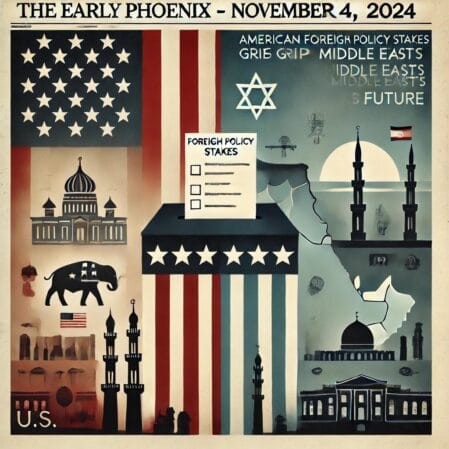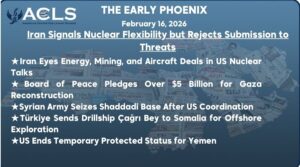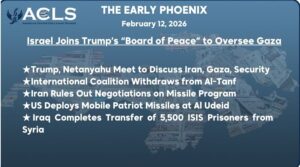
IRAN
-
Trump Reelection Seen as “Poisoned Chalice” for Khamenei
Two days before the U.S. election, Iran held nationwide rallies commemorating the November 4, 1979 U.S. Embassy hostage crisis, where 52 Americans were held for 444 days. Iranian leaders frame this event as a symbol of defiance against foreign interference. In Tehran, demonstrators, mostly students, marched to the former U.S. Embassy and burned the American flag.
The 1979 hostage crisis endures as a symbol of Iran’s resistance to U.S. influence and is celebrated as a mark of regional strength. Ahmad Alamolhoda, a close ally of Supreme Leader Khamenei, described anti-Americanism as central to Iran’s identity and global strategy. He claimed that Iran’s resistance has heightened anti-American sentiment worldwide, empowered “resistance” groups in the Middle East, and reinforced Iran’s internal power.
IRGC Commander Hossein Salami stated, “Today, it is the US that is observing its political sunset.” During the rallies, Salami warned of an imminent collapse, vowing that “the resistance forces” would deliver a crushing response to the United States and Israel for their actions against Iran and its allies.
Tehran Times reported that, regardless of the U.S. presidential election outcome, American support for Israel will persist, emphasizing that both candidates align closely with Israel. Tehran Times, highlighted what they see as the Biden-Harris administration’s failure to separate the Iranian “axis of resistance” in Lebanon from Gaza. Iranian Analysts were cited in Iran International, an opposition platform, to publicly suggest that U.S. policy toward Iran may remain steady regardless of the election winner, though tactics could shift. Former lawmaker Shahryar Heidari anticipates that Trump’s approach might heighten tensions, while Harris may pursue a more cautious strategy. Experts conclude that both candidates aim to avoid direct conflict with Iran, given U.S. interests in preventing regional instability.
Reuters and Times of Israel, however, provided a contrasting report stating that Iran and its proxies in Lebanon, Iraq, and Yemen fear a Trump victory and are bracing for its military and economic impact. They explained citing anonymous Iranian sources that while one Iranian official stated they are “prepared for all scenarios,” others warned that Trump’s win would be a “nightmare” as it could bolster Israeli strikes on Iran’s nuclear sites, reinstate severe sanctions, and renew its regional isolation.
Sharq Al Awsat, a Saudi publication concurred with the Reuters assessment citing Hassan Hassan, a researcher on Islamist groups who remarked that Trump’s approach is “much worse for Iran than Harris,” adding that both U.S. parties increasingly view Iran as a problem and that Washington has largely delegated Iran-related conflicts to Israel. Regional officials describe Trump’s potential reelection as a “poisoned chalice” for Khamenei.
Finally, U.S. intelligence reports suggest that Iran is intensifying efforts to influence the upcoming presidential elections by reaching out directly to American citizens, potentially stirring social divisions or inciting violence. According to sources cited by NBC, Iranian hackers have accessed U.S. voter records, raising concerns about targeted disinformation campaigns. American officials accuse both Iran and Russia of conducting “propaganda operations aimed at swaying American voters,” with Russia reportedly favoring Trump, while Iran supports the opposite direction. An intelligence memo further noted that Iranian actors have breached voter registration systems in certain states, increasing the risk of voter manipulation through misleading information.
ISRAEL
-
66% of Israelis Support Trump Over Harris
A recent Channel 12 poll indicates that 66% of Israelis prefer Donald Trump as the next U.S. president, while 17% support Kamala Harris. The remaining 17% are undecided. Support for Trump is notably high among voters of Prime Minister Benjamin Netanyahu’s coalition, with 93% favoring him. An analysis by The Jerusalem Post compares the Middle East policies of Trump and Harris. While both express support for Israel, they differ in style and rhetoric. The report suggests that these differences could affect future U.S. involvement in the region.
IRAQ
-
Iraq Divided on U.S. Election, Faces Regional Tensions
Iraqis are divided over the Trump-Harris U.S. election, with many considering Trump’s reduced military presence as beneficial, while others expect Harris might enhance cooperation with Iraq on security and economic issues. Iraqi Americans similarly split, with Trump supporters favoring his assertive foreign policy and Harris backers aligning with Biden’s diplomatic approach easing pressure on Iran. Meanwhile, Iraqi Shiite militia escalated tensions by launching three drone attacks on Israeli sites in the Jordan Valley and Golan Heights. The pro-Iran Nujaba Movement pledged support for Iran, with spokesperson Haider Lami announcing readiness for advanced drone strikes on sensitive Israeli sites. An Israeli report warned of retaliatory strikes on Iraqi locations if attacks persist, identifying potential targets beyond factional bases and raising concerns over threats to Iraq’s oil and power infrastructure. Satellite images also indicate Iran has transferred ballistic missiles to Iraq, potentially for strikes on Israel.
GULF NATIONS
-
Gulf States Weigh US Election Impact on Relations
The 2024 US presidential election presents a pivotal moment for the Gulf states, as they monitor how future US leadership could shape critical areas of cooperation. Trump’s pro-oil stance could boost Gulf exports short-term, but risks price drops if U.S. oil output surges. Harris supports climate policies that might increase oil prices but could shift Gulf states toward more sustainable energy. Analysts suggest the Gulf’s economic stability may hinge on which candidate prevails. Historically, the GCC countries have leaned toward Republicans, who are perceived as supportive of Gulf security concerns, particularly against Iran. While strategic ties remain essential, the Gulf states are diversifying relations with global powers like China and Russia, signaling a more balanced diplomatic approach.
-
Saudi Publication Elaf Warns Middle East of U.S. Election Fallout
Saudi publication Elaf reported that as U.S. election media coverage overshadows global crises, the Gaza conflict has deeply divided American voters, drawing focus from pressing domestic issues. This polarization may challenge Kamala Harris, with potential backlash linked to Biden’s handling of Gaza, while Trump’s possible return offers limited change for Palestinians yet hints at a different stance toward Netanyahu, urging a swift resolution. The publication questions the potential Middle East turmoil from Election Day on November 5 to Inauguration on January 20, suggesting U.S. political instability may stall foreign policy, risking escalations in a region already fraught with existential conflicts. The report highlights that this interim could offer Israeli Prime Minister Netanyahu an opportunity to heighten tensions with Iran, as Iran persists in its anti-Israel rhetoric.
SYRIA
-
Syrian American Voters Lean Toward Trump in 2024 Election
Syrian American voters are showing a noticeable preference for Donald Trump in the 2024 U.S. presidential election. This inclination stems from discontent with the current Democratic administration’s handling of Syria, including what many perceive as a disregard for the Syrian conflict and tacit support for normalization with the Syrian regime. Voters in this community favor Trump for his past stance against Iranian influence in Syria, which was a priority during his presidency.
TURKIYE
-
Türkiye Prepares for Trump’s Return, Weighs Regional Risks
Türkiye is weighing potential risks and opportunities as Trump eyes a return to the White House. President Erdogan recently reached out to Trump, signaling readiness for closer ties. Experts believe Trump’s policies may encourage bilateral cooperation, contrasting with Biden’s reserved stance. Key issues include Trump’s past support for U.S. withdrawal from Syria and potential economic sanctions targeting China over Russia, affecting Türkiye’s trade. However, Türkiye recalls volatile ties and sanctions under Trump’s previous term. Homeland Party leader Dogu Perincek warned Ankara against assuming control of the U.S. “Kurdistan” project, calling it a strategy to separate Türkiye from allies like Russia and China. Meanwhile, Nationalist Movement Party leader Devlet Bahceli proposed that PKK leader Abdullah Ocalan call for the group’s dissolution, potentially influencing Türkiye’s security stance based on post-election U.S. policy shifts.
LEBANON
-
US Elections Unlikely to End Lebanon War
Lebanese analysts say the U.S. election outcome won’t affect Lebanon’s conflict, which hinges on Lebanon accepting Israeli-American terms. The aim remains to eliminate Hezbollah and curb Iran’s influence. Israel’s Netanyahu seeks to escalate efforts against Iran, while Iran is expected to respond minimally, focusing less on Lebanon as Hezbollah faces ongoing strikes. Muslim-American volunteers for Kamala Harris face challenges convincing the community to support her, with frustration over the Democratic Party’s stance on Gaza and Israel diminishing enthusiasm. In a private WhatsApp group, organizers acknowledged difficulty swaying voters, citing a preference for third-party candidates or even Donald Trump, who has gained endorsements from key Muslim-American figures.
Russia & Ukraine
-
Medvedev Warns Trump of JFK-Style Fate Over Ukraine Peace Stance
Ukraine fears a Trump victory could sever critical American support against Russia, as the former president has criticized aid and promised to quickly end the conflict. Facing ammunition and manpower shortages, Ukraine worries a Republican win would compromise its sovereignty battle. Former Ambassador Oleh Shamshur warns that Trump’s return could lead to a drastic U.S. policy shift, while Zelensky remains firm against conceding territory. Russian Security Council Deputy Chair Dmitry Medvedev, meanwhile, warned Trump could face an assassination attempt over any Ukraine peace attempts, likening the risk to JFK’s fate. Medvedev stated both U.S. parties share a strong anti-Russia stance, with Harris pledging ongoing support for Kyiv if elected, highlighting a stark contrast with Trump’s approach.



